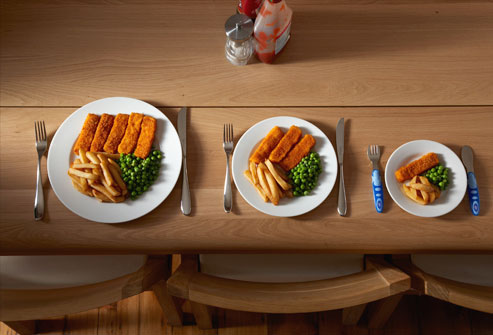Well coaches specialize in helping clients change their health behaviors. Well Coaches act as partners with their clients, not as experts. Since all of our food choices are influenced by psychology, research on what techniques make it easier to resist junk food is very valuable.
Well Coaches Should Pay Attention to Behavioral Nudges
Recent research demonstrates that the best way well coaches can help their clients is to focus on behavior change. We need to make it easier for people to make healthy choices and exercise portion control.
Pierre Chandon, Professor of Marketing at INSEAD, and Romain Cadario, Assistant Professor of Marketing at IÉSEG School of Management, set out to determine what type of “nudge,” an intervention that attempts to influence behaviors without using economic incentives and while preserving freedom of choice, is the most effective.
The study analyzed several different types of interventions or nudges and grouped them into three broad categories. The categories tested were: cognitive, affective, and behavioral. The results of the study showed behavioral nudges to be the most effective way to improve healthy eating.
Behavior Change Research
This is how the study was conducted:
- The study identified seven different types of nudges and classified them into three broad categories, depending on how they worked.
- The categories were: cognitive, affective and behavioral.
- Cognitive nudges provide information, such as nutrition counts or make healthy options more visible on the shelf or on the menu.
- Affective nudges seek to influence how people feel, without necessarily changing what they know, for example by touting the taste of the food, not its healthiness.
- Behavioral nudges try to directly change behaviors without necessarily changing what people think or what they want, for example by changing the amount of food on the plate or by making healthier foods easier to select and consume.
Conclusions of Health Behavior Change Research
Here are the study’s conclusions:
In a meta-analysis of real-life experiments drawn from food science, nutrition, health economics, marketing and psychology, the authors find that behavioral nudges — facilitating action rather than providing knowledge or inducing feelings reduces calorie intake better than other methods.
- Cognitive nudges reduced calories by about 64 kcal, or six sugar cubes worth of calories.
- Affective nudges had an expected daily reduction of 129 kcal, around the same as 13 cubes of sugar.
- Behavioral nudges led to a more substantial change in calorie intake when compared to cognitive and affective nudges, the authors found. On average, they could reduce daily calorie intake by 209 kcal or 21 cubes of sugar.
According to Chandon, “Just changing the amount of food on a plate or the location of the food — without necessarily educating people about nutrition content or convincing them that they should eat healthily — is the most effective intervention because you don’t need to rely on changing people’s beliefs or their goals. There is tremendous potential to help people to eat better.”
Click here to read entire article on how well coaches should promote behavioral nudges for permanent lifestyle change.







